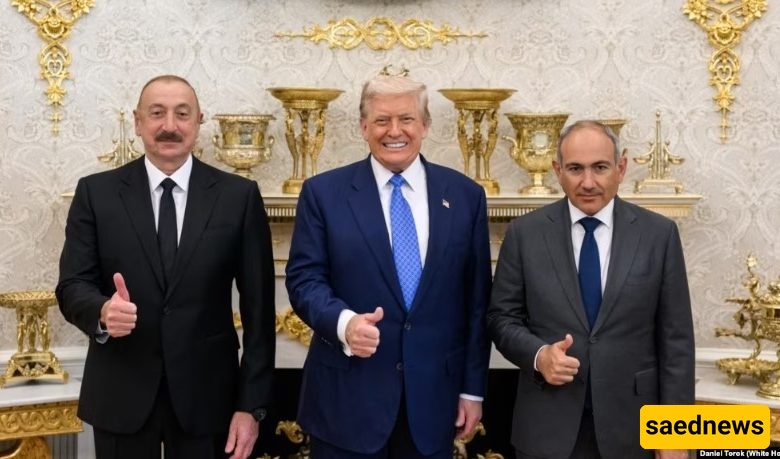SAEDNEWS: The recent peace agreement between Azerbaijan and Armenia, brokered by the U.S., exposes critical weaknesses in Iran’s regional diplomacy, raising urgent questions about Tehran’s response to increasing American and Israeli influence along its sensitive northwestern frontier.

According to the political service of SaedNews analytical news platform, the news of the peace agreement signed yesterday, Friday, in Washington between Ilham Aliyev and Nikol Pashinyan, regardless of its content, is significant for Iran from two perspectives.
The Jomhouri Eslami newspaper wrote: First, why should peace between the Republic of Azerbaijan and Armenia require the initiative of the United States instead of being mediated by Iran? And second, Iran’s diplomatic weakness has given the U.S. the opportunity to reach a political solution to the Zangazur corridor and easily turn its neighbor, right on Iran’s northwestern sensitive border, into a corridor dominated by American influence.

1- In the last year of Donald Trump’s first presidential term, when the conspiracy of normalizing Arab-Israeli relations under the title of the “Abraham Accords” was underway, we warned our country’s diplomatic apparatus, which at the time was still under the twelfth government, that the Zionist regime, supported by the Trump administration, was encircling Iran’s intelligence and security through expanding its influence in the UAE, Bahrain, and the southern Persian Gulf. Since then, we have repeatedly emphasized the need to confront this conspiracy with strong diplomacy. However, no significant action was taken, and we only witnessed threats and declarations about what Iran would do if Israel took certain actions.
2- The continuous movements of the Zionist regime on Iran’s northwestern borders have been clearly visible for several years. The alarm regarding these threats was sounded at the time, and many experts repeatedly warned, but no significant diplomatic effort was made to counter this conspiracy.
3- With the Taliban’s takeover of Afghanistan, based on the Doha Agreement between the U.S. and the group, repeated warnings were issued that Taliban rule in Afghanistan is a dangerous plot to complete the encirclement of Iran by the U.S. and the Zionist regime. We must confront this conspiracy with full awareness. At that time, all those who warned about the Taliban conspiracy also emphasized that the way to counter it is relying on strong and intelligent diplomacy, a point we repeatedly reiterated in the editorials of Jomhouri Eslami newspaper. Unfortunately, these warnings were ignored.
If only it were mere neglect; unfortunately, the thirteenth government opened the country’s doors to Afghan nationals, issuing thousands of visas daily, and thousands more entered Iran without visas, changing the demographic fabric of some parts of our country. In addition, national media and other government-affiliated outlets actively sanitized the Taliban, and officials provided extraordinary facilities in this campaign to legitimize the group. The self-proclaimed and unrecognized Taliban regime gained all diplomatic privileges—from embassies and consulates to attending meetings with senior Islamic Republic officials and extensive trade relations. It went so far that the foreign minister of the fourteenth government committed a major political mistake by traveling to Kabul and returned to Tehran without any achievement, while the Taliban neither granted Iran’s rightful water share from the Helmand River nor showed any flexibility regarding other legal demands.
4- Now, with the Trump administration’s involvement in the Armenia-Azerbaijan issue, the U.S. has aligned with the Zionist regime to extend its presence on our northwestern borders. Regarding the extensive Zionist infiltration in the Republic of Azerbaijan, many warnings have been issued over the years, but our diplomatic circles remained in deep sleep. Even the 12-day war, which the Zionist regime used Azerbaijan’s territory to attack Iran, did not awaken our diplomacy!
The most important question these days is: How long will our diplomacy remain in this deep slumber? The encirclement is being completed; is it not time to compensate for these diplomatic weaknesses?

